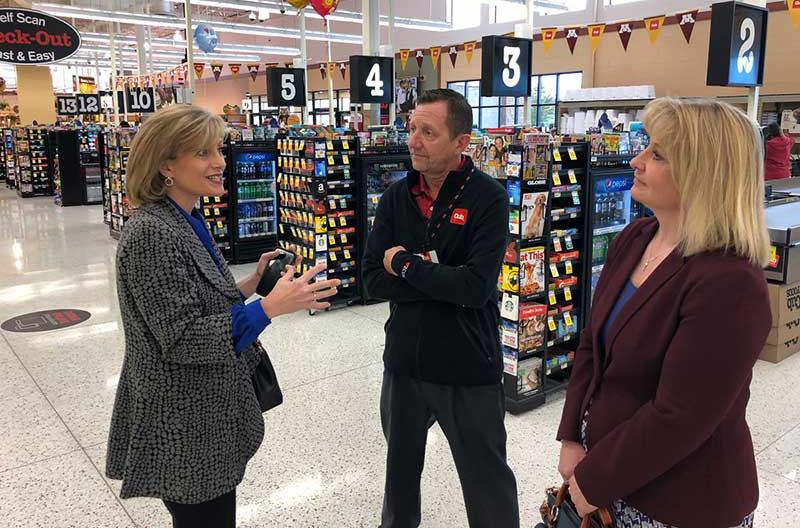by Terrie Ellerbee/editor-Midwest
There is much that is new and unique in Minnesota right now. Let’s start with the Minnesota Grocers Association’s (MGA) new logo. It was refreshed in 2018 after almost 20 years to more accurately reflect the association’s mission. The logo now features a grocery cart as the foundation for the state, reflecting the sustainability of the food industry in Minnesota.
The MGA also moved into a new office in 2018 after 30 years in a residential area. It now is located in the Energy Park office complex in St. Paul.
“It’s nice for the next evolution of the association,” MGA President Jamie Pfuhl told The Shelby Report. “It is a little more contemporary and professional—a little better representation of who we want to be and where we want to go.”
And then there are the new legislators in the state house that the MGA will get to know and educate as 2019 dawns. There are 39 of them. That huge number is the result of record-breaking voter turnout in the state. In fact, Minnesota had the best voter turnout in the nation for the November 2018 midterm elections, with 64.25 percent of eligible voters showing up at the polls. Pfuhl said the “voter turnout story here is just phenomenal.”
Jeff Johnson, the Republican candidate for Minnesota governor, got the second-most votes in the state’s history, bested only by the winner of this year’s gubernatorial race: Democrat Tim Walz. With his win, it will be the first time in the history of the state that a Democrat will hold the governorship for three consecutive terms. Walz begins his first term when Gov. Mark Dayton’s second one ends.
But wait, there’s more.
Minnesota also is unique in that it is the only state in the nation with a divided government going into 2019. The House now has a Democrat majority. State senators were not up for re-election in 2018, so the Senate remains Republican.
It is safe to say it won’t be business as usual in Minnesota.
The newcomers will not necessarily come in with any legislative experience so there could be a massive learning curve.
“We did kind of have this wave effect in Minnesota come through,” Pfuhl said. “We lost a lot of good, moderate legislators that we were able to work with on both sides of the aisle, so it’s a little unfortunate because you lose some of that continuity.”
The MGA always sends introductory letters congratulating newly elected legislators but it had been in contact with many candidates prior to the midterms.
“We were doing store tours with candidates leading up to the election and we’ll continue that as we go through,” Pfuhl said. “There will be a lot of opportunities to educate them about the role that the grocer plays in their community. We want to make sure that their newly-elected or re-elected legislator understands how important the grocer is to the vitality of their community. That is going to be more important than ever right now.”
The MGA could have its hands full. Walz and his soon-to-be lieutenant governor Peggy Flanagan campaigned on a strong labor agenda, including mandatory paid family leave, predictive scheduling and a $15 minimum wage.
But Pfuhl said the MGA’s role doesn’t change depending on which party is in the majority.
“We have always prided ourselves on having conversations all across the aisle because we serve everyone,” she said. “Our ultimate goals are serving our customers, providing good jobs and ensuring that food is safe. That stays the same. Keeping our focus on what’s important will help bring that to the forefront.”
Heroes of the industry
Just before the election in November, the MGA released the names of four Heroes of the Food Industry it honored for leadership during the 2018 Minnesota legislative session.
MGA annually recognizes state legislators with its Heroes of the Food Industry award. This year’s heroes include Sen. Roger Chamberlain (R-Lino Lakes), Sen. Mary Kiffmeyer (R-Big Lake), Rep. Ron Kresha (R-Little Falls), and Rep. Cindy Pugh (R-Chanhassen).
“Our 2018 Heroes of the Food Industry displayed strong leadership in advocating for commonsense policies that create job growth and spur economic activity. They truly are champions of a free marketplace, not placing undue burdens on local business and helping our neighbors keep their shopping baskets full,” Pfuhl said. “This award is a testament to their vision, work ethic and support of the industry from farm to fork.”
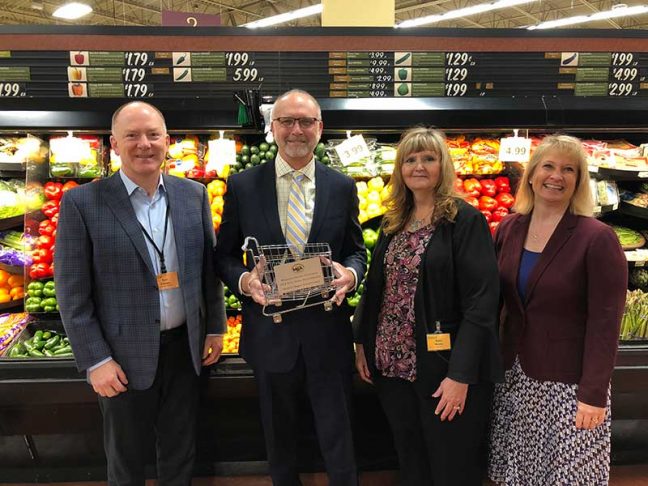
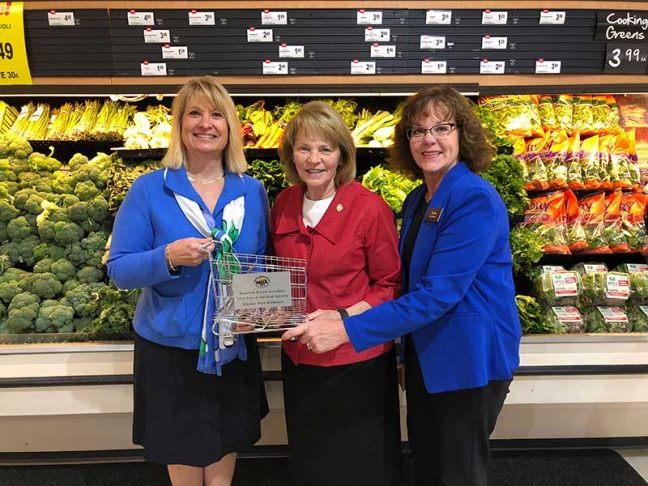
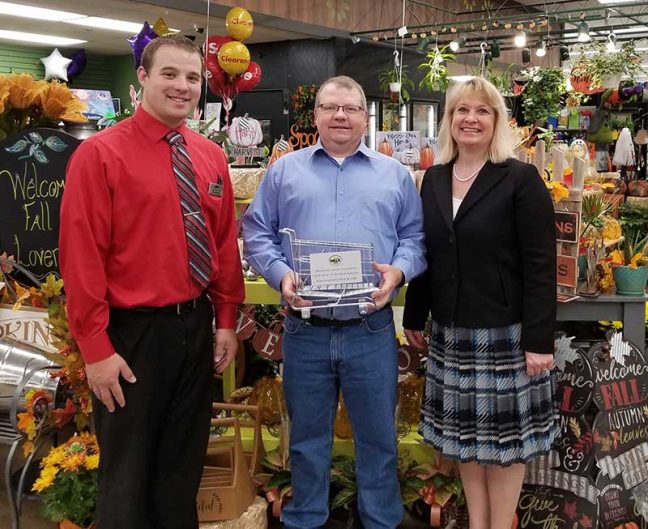
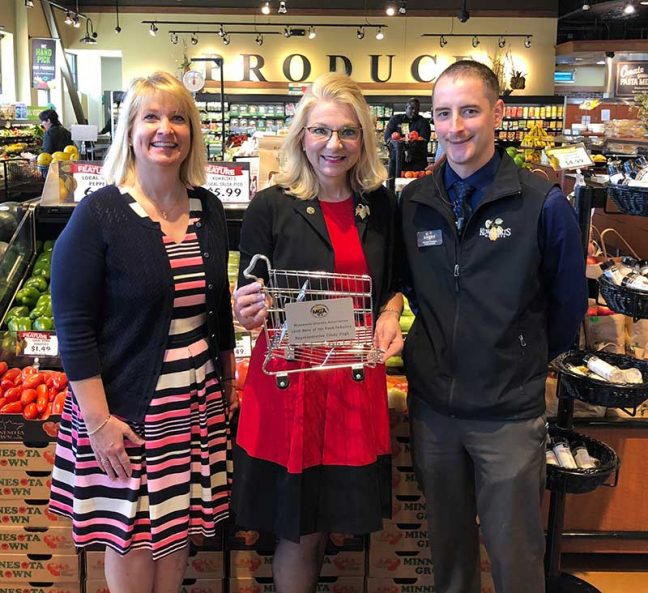
Legislators were presented with the award at a grocery store in their legislative district. After the presentation, members discussed priority issues in the store so lawmakers could further understand the complex nature of the grocery industry and the many challenges they face to remain viable in today’s competitive marketplace.
“Our success at the capitol has a direct correlation to our member’s proactive engagement,” said Mike Karbo, VP of government affairs for the MGA. “We thank our 2018 Heroes for their outstanding commitment to the food industry and the strength of their relationship with their local grocer.”
To receive a Hero of the Food Industry Award, a legislator must have the highest rating on the MGA Legislative Scorecard. In addition, the legislator must distinguish himself or herself by advocating strongly and effectively on a priority issue. Of the four legislators selected, one will be chosen to be the 2019 Minnesota Grocers Association Legislator of the Year. That award will be presented during the MGA’s legislative dinner in St. Paul on Jan. 22.
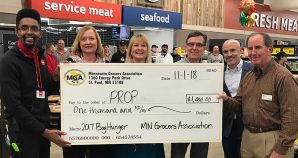
Cub Foods, Russ Davis Wholesale honored
Cub Foods is one of eight companies statewide to be recognized for its exceptional efforts to end hunger in its communities through the annual MGA Bag Hunger Campaign.
The campaign was coordinated by the MGA and included 258 of the association’s retail members, seven vendor partners and community food banks and food shelves across the state. The MGA’s hunger programs have provided more than 37 million meals to Minnesota families in need since 2008.
Participating stores and vendor locations offered multiple opportunities for consumers to contribute to the campaign. Many retailers encouraged customers to donate grocery items in-store or round up their purchase totals at the register, contributing the price difference to feed local families. Others prominently displayed the names of customers who donated money on grocery list icons. All food and monetary contributions collected were distributed to a variety of local food shelves, banks and support organizations across the state.
Cub Foods received the Silver Plate Award for Best Overall Program Support—Retailer in the Bag Hunger Campaign Silver Plate contest, which offers a chance for campaign participants to get creative with in-store advertising while engaging consumers to end hunger. In addition to the award, Cub Foods presented a $1,000 donation to the food charity of its choice, PROP, on behalf of the 2017 Bag Hunger Campaign. PROP is a nonprofit that helps individuals and families in need in Eden Prairie and Chanhassen through food programs, short-term financial assistance, employment assistance and social support services.
“At Cub, our success is dependent on the success of the community and it gives us great pleasure to donate $1,000 to PROP, thanks to the Bag Hunger Campaign and Cub customers,” said Chad Ferguson, president of Cub Operations. “We are constantly amazed at the generosity of our shoppers and thank them for making this donation possible.”
“It was exciting to see these partnerships develop and everyone’s hard work on the Bag Hunger Campaign make a positive difference for Minnesota families in need,” Pfuhl said. “I applaud Cub Foods on its successes in this campaign. All of our participants did a great job raising awareness on a community level and rallying consumers behind this important cause.”
Russ Davis Wholesale is outstanding vendor
Fresh produce processor and distributor Russ Davis Wholesale (RDW) received the MGA’s 2018 Outstanding Vendor Award. MGA selected RDW for the distinction based on its innovation in customer support and its excellence in customer service.
“Our customers are the lifeblood of our business and we believe it’s imperative that we listen to and understand their needs, and provide them with exemplary service,” said Adam Gamble, RDW president. “We are honored that the Minnesota Grocers Association recognized us for this component of our business, which is so vitally important to our company.”
RDW is known within the produce processing and distribution industry for its ability to customize its deliveries to the specific needs of its customers and deliver both conventionally and organically grown fruits and vegetables quickly. It serves retail, wholesale and foodservice customers in the Midwest. This winter, the company will expand into the western U.S. when it opens a produce processing center in Pueblo, Colorado.
Good Food Access Program designed to help grocers
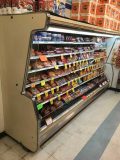
There is a struggle in the rural areas of Minnesota, just as there is in other states. Small businesses, including grocers, have been forced to close due to population changes and increased competition.
“The growth that we’re seeing really is coming more in the metro, with some closures and changing of hands in the rural areas,” Pfuhl said. “The population is driving opportunities in the metro. That is an interesting dichotomy as we move to the future. What is this going to look like?”
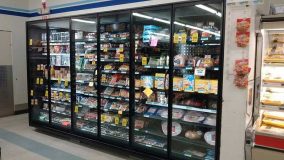
The hope, of course, is that rural grocers will be able to stay in business and continue to serve their communities. An initiative called the Good Food Access Program (GFAP) was established by the Minnesota Department of Agriculture through legislation passed by the 2016 state legislature. GFAP is designed to help increase the availability of affordable, nutritious and culturally appropriate food for underserved communities by offering financial support and technology assistance to open, renovate or expand the operations of grocery stores and small food retailers. Projects must be located in or serve food deserts and populations such as the elderly or people with disabilities in low- and moderate-income areas.
With minimal funding—just $150,000 in 2017—it helped eight independent grocers, including Collier’s SuperFair Foods in Saint James and Mini Market Lupita in Worthington. Pierz Foods received a grant that allowed for the purchase of new coolers.
“The Good Food Access grant is a good thing,” Pierz Foods owner Allen Denham told The Shelby Report. “It’s a way for small independents to help make improvements to their operation.”
Denham has owned the 5,500-s.f. Pierz Foods for 15 years. He said the community was behind the store as it updated operations.
“They were excited and glad to see the improvements,” he said. “It was a nice update. Going from an open case to a closed case reduced the electric bill and helps sustain the life of the produce.”
The deadline to apply for 2019 GFAP equipment and physical improvement grants is 4 p.m. on Jan. 17. Grant awards may range from $2,500 to $50,000, and up to 50 percent of the award may be requested in advance. Visit mda.state.mn.us/grants/grants/gfapequipmentgrant for more information.

